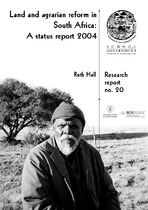Joint ventures and livelihoods in emerging small-scale irrigation schemes in Greater Sekhukhune District: Perspectives from Hereford
Abstract
Small-scale irrigation farming is
envisaged as playing a progressively
larger role in rural development
and in reducing some of the inequalities
inherent in South Africa’s space economy.
The promotion of entry by black farmers
into commercialised small-scale irrigation
farming appears to have been bolstered by
the late 1990s convergence of agricultural,
water, land, local government and other
sector reforms. Concomitant to these reforms,
the government’s macro-policy shifts seem
to favour the creation of a black farming
elite, and an important question centres on
the possible negative impacts of neo-liberal
policies on the livelihoods of the poorest
and most vulnerable people within smallscale
irrigation farming communities. It is
also debatable whether a new class of petty
commodity producers can establish a viable
niche within global commodity chains,
given the significant constraints to effective
participation in a highly competitive and
globalised commodity production sector.

